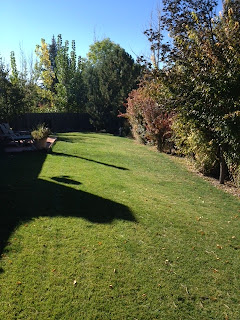If you are experiencing chronic turf problems including fungus, thatch or thin, weak grass, consider using a humic acid.
 |
| Before |
 |
| After |
One way to make your lawn healthier is to add humic acids on a regular basis. Humates come from leonardite coal, which is mined in North Dakota. All soils will benefit from humic acid, but soils with high clay content and/or low organic levels will show the most change. Think of humic acid as an organic bio-stimulant for your soil. Using humic acid can help restore your lawn’s root system. Healthy root systems increase efficient water and nutrient uptake. Healthier root systems also decrease stress levels on the plant, including grass. Less stress equals less sustibility to things like fungus. The above illustration is an actual customer's lawn, before aeration and adding humic acid. Two months later the lawn had recovered to the extent you see on the right. You can get the benefits of humic acid in your own lawn by applying Natural Guard Soil Activator.
Still have questions? Don't hesitate to ask! Comment, call, stop by, Facebook us, etc. etc.




